Risk Placing Real Emotion at the Center of Your Work
Yes, it’s all melting, but if we close our eyes we might remember, standing in the same spot … what we loved.

Onward into my post!
“If something inside of you is real, we will probably find it interesting, and it will probably be universal. So you must risk placing real emotion at the center of your work.” Author Anne Lamott 
Sandy Neily here: I am, lately, needing inspiration so I’m rereading “Bird by Bird” and now, sharing some with you! “Anne Lamott understands better than anyone that writers need help. . . She writes so well, in fact, that it’s hard to believe that she, too, has trouble with writing. That’s what’s so deeply comforting about this book.” The Wall Street Journal
“Bird by Bird: Some Instructions on Writing and Life”Listen to her, here. And if you haven’t found this amazing interview series with “old ladies” interviewed by Julia Lewis-Dreyfus, here she interviews Anne Lamott. (Wow. Well, don’t miss the Jane Fonda one either.)
“Thirty years ago my older brother, who was ten years old at the time, was trying to get a report written on birds that he’d had three months to write, which was due the next day. We were out at our family cabin in Bolinas, and he was at the kitchen table close to tears, surrounded by binder paper and pencils and unopened books about birds, immobilized by the hugeness of the task ahead. Then my father sat down beside him put his arm around my brother’s shoulder, and said, “Bird by bird, buddy. Just take it bird by bird.”
“For some of us, books are as important as almost anything else on earth. What a miracle it is that out of these small, flat, rigid squares of paper unfolds world after world after world, worlds that sing to you, comfort and quiet or excite you. Books help us understand who we are and how we are to behave. They show us what community and friendship mean; they show us how to live and die.”
“Perfectionism is the voice of the oppressor, the enemy of the people. It will keep you cramped and insane your whole life, and it is the main obstacle between you and a shitty first draft. I think perfectionism is based on the obsessive belief that if you run carefully enough, hitting each stepping-stone just right, you won’t have to die. The truth is that you will die anyway and that a lot of people who aren’t even looking at their feet are going to do a whole lot better than you, and have a lot more fun while they’re doing it.”
“Writing and reading decrease our sense of isolation. They deepen and widen and expand our sense of life: they feed the soul. When writers make us shake our heads with the exactness of their prose and their truths, and even make us laugh about ourselves or life, our buoyancy is restored. We are given a shot at dancing with, or at least clapping along with, the absurdity of life, instead of being squashed by it over and over again. It’s like singing on a boat during a terrible storm at sea. You can’t stop the raging storm, but singing can change the hearts and spirits of the people who are together on that ship.”
“E.L. Doctorow said once said that ‘Writing a novel is like driving a car at night. You can see only as far as your headlights, but you can make the whole trip that way.’ You don’t have to see where you’re going, you don’t have to see your destination or everything you will pass along the way. You just have to see two or three feet ahead of you. This is right up there with the best advice on writing, or life, I have ever heard.”
“If something inside of you is real, we will probably find it interesting, and it will probably be universal. So you must risk placing real emotion at the center of your work. Write straight into the emotional center of things. Write toward vulnerability. Risk being unliked. Tell the truth as you understand it. If you’re a writer you have a moral obligation to do this. And it is a revolutionary act—truth is always subversive.”
“I heard a preacher say recently that hope is a revolutionary patience; let me add that so is being a writer. Hope begins in the dark, the stubborn hope that if you just show up and try to do the right thing, the dawn will come. You wait and watch and work: you don’t give up.”
“Because this business of becoming conscious, of being a writer, is ultimately about asking yourself, How alive am I willing to be?”
“Try looking at your mind as a wayward puppy that you are trying to paper train. You don’t drop-kick a puppy into the neighbor’s yard every time it piddles on the floor. You just keep bringing it back to the newspaper.”
“But how?” my students ask. “How do you actually do it?”
You sit down, I say. You try to sit down at approximately the same time every day. This is how you train your unconscious to kick in for you creatively. So you sit down at, say, nine every morning, or ten every night. You put a piece of paper in the typewriter, or you turn on the computer and bring up the right file, and then you stare at it for an hour or so. You begin rocking, just a little at first, and then like a huge autistic child. You look at the ceiling, and over at the clock, yawn, and stare at the paper again. Then, with your fingers poised on the keyboard, you squint at an image that is forming in your mind — a scene, a locale, a character, whatever — and you try to quiet your mind so you can hear what that landscape or character has to say above the other voices in your mind.”
“The problem is acceptance, which is something we’re taught not to do. We’re taught to improve uncomfortable situations, to change things, alleviate unpleasant feelings. But if you accept the reality that you have been given- that you are not in a productive creative period- you free yourself to begin filling up again.”
“I don’t think you have time to waste not writing because you are afraid you won’t be good at it.”
“If you are a writer, or want to be a writer, this is how you spend your days–listening, observing, storing things away, making your isolation pay off. You take home all you’ve taken in, all that you’ve overheard, and you turn it into gold. (Or at least you try.)”
Anne Lamott is the New York Times bestselling author of Help, Thanks, Wow; Small Victories; Stitches; Some Assembly Required; Grace (Eventually); Plan B; Traveling Mercies; Bird by Bird; Operating Instructions, and the forthcoming Hallelujah Anyway. She is also the author of several novels, including Imperfect Birds and Rosie. A past recipient of a Guggenheim Fellowship and an inductee to the California Hall of Fame, she lives in Northern California.
 Sandy’s debut novel, “Deadly Trespass, A Mystery in Maine” won a national Mystery Writers of America award, was a finalist in the Women’s Fiction Writers Association “Rising Star” contest, and was a finalist for a Maine Literary Award. The second Mystery in Maine, “Deadly Turn,” was published in 2021. Her third “Deadly” is due out in 2025. Find her novels at all Shermans Books (Maine) and on Amazon. Find more info on Sandy’s website.
Sandy’s debut novel, “Deadly Trespass, A Mystery in Maine” won a national Mystery Writers of America award, was a finalist in the Women’s Fiction Writers Association “Rising Star” contest, and was a finalist for a Maine Literary Award. The second Mystery in Maine, “Deadly Turn,” was published in 2021. Her third “Deadly” is due out in 2025. Find her novels at all Shermans Books (Maine) and on Amazon. Find more info on Sandy’s website.
Lea Wait's Blog
- Lea Wait's profile
- 508 followers



